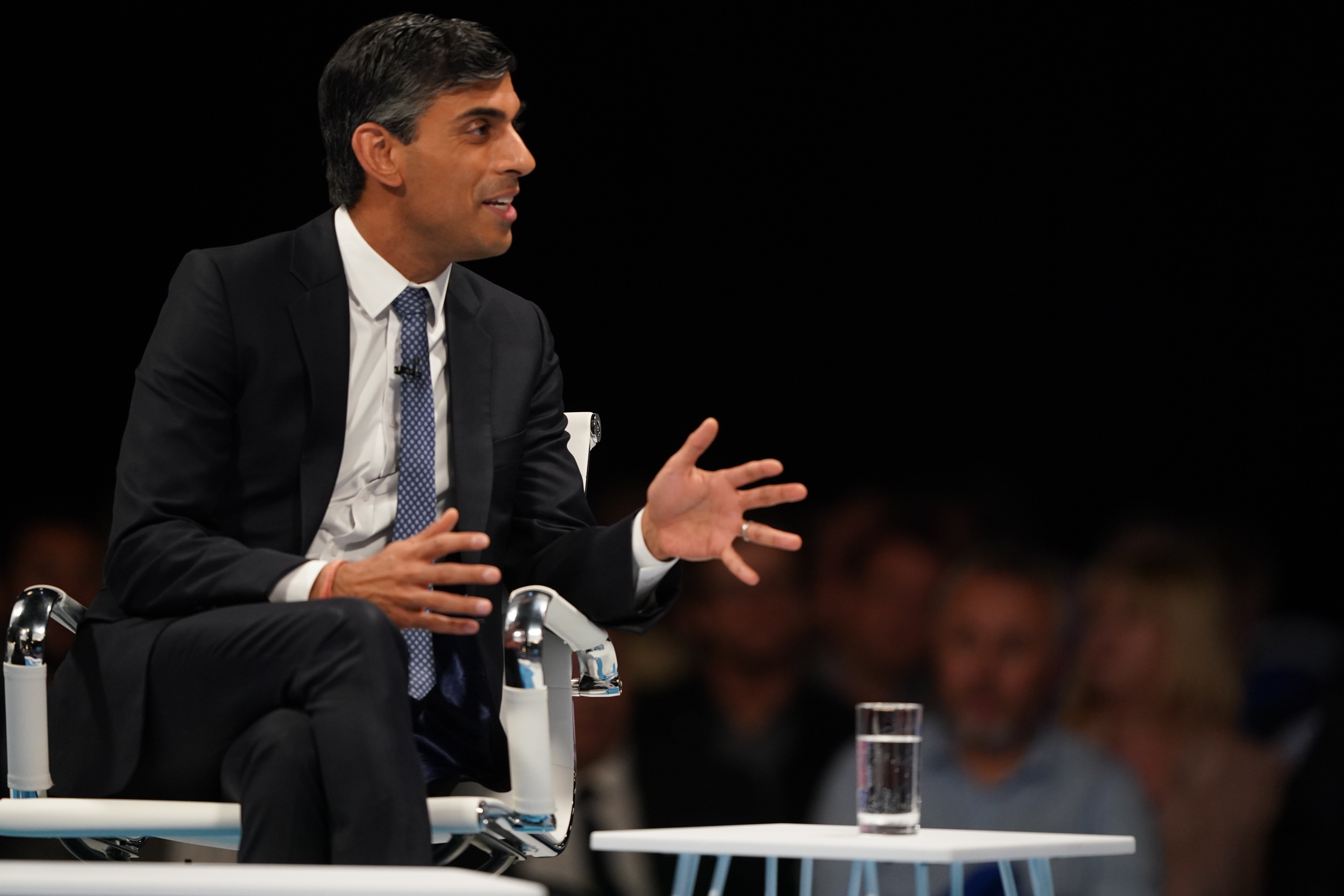Sunak says Truss’s tax-cutting plans will create ‘sugar rush boom’
The Tory leadership hopeful denied his plans to tighten fiscal policy would lead to a recession in a crunch interview with Andrew Neil.

Rishi Sunak has denied his path of tightening fiscal policy would lead to a recession as he claimed rival Liz Truss’s plans for vast tax cuts would create a “sugar rush boom”.
The Tory leadership hopeful was grilled on the economy, immigration, and his wife’s tax status for nearly half an hour by veteran political journalist Andrew Neil, with whom Ms Truss has so far declined to sit down.
Mr Sunak was seeking to regain his footing in the contest in which he has described himself as the underdog, but was dealt a blow when Ms Truss received another major endorsement – from former contender Tom Tugendhat.
There is a finite amount of asylum seekers that we are able to integrate
The former chancellor used the Channel 4 interview to take a fresh swipe at Ms Truss’s approach to tax, an issue that has dominated the bitter race for No 10.
Neil challenged Mr Sunak over his plans to tighten fiscal policy at a time when “the global economy grinds to a halt, as monetary policy has been tightening”, suggesting he would “ensure a recession”.
Mr Sunak said: “I think it’s absolutely the right thing to do to not put fuel on the fire of the inflation problem that we already have.
“What we should do is focus on long-term growth because that’s what we need, sustainable growth, not a sugar rush boom that will make us feel better for months, but then it runs out of control, let inflation get set into the system, let the Bank of England have to react with even higher interest rates.”
Mr Sunak said a recession was “not the forecast of the majority of most independent forecasters here in the UK”.
He reiterated his priority was to “get to grips with inflation as quickly as possible because inflation makes everybody poorer”.
Mr Sunak also defended his policy to hike national insurance thresholds as “undoubtedly, objectively progressive” when Mr Neil suggested it penalised workers, and denied that his pledge to cut VAT on energy bills was a U-turn that demonstrated “bad judgment”.
Neil asked him: “In February you told the Commons that cutting VAT on energy bills would, these are your words, ‘disproportionately benefit wealthy candidates’.
“Now, as your campaign fails to gain traction among Tory members, you propose to suspend VAT on energy bills – not just bad judgment but lack of consistency.”
Mr Sunak replied: “No, absolutely not. I’ve always said from the beginning that as we knew more about what energy bills would actually be in the autumn that I will stand ready to do more.”
On immigration, the former chancellor said there was a “finite amount” of asylum seekers the UK can accommodate.
He rejected Mr Neil’s assertion that his proposed cap on the number of asylum seekers accepted each year is “unsavoury”, as he argued for an “orderly” and “controlled” system for taking people in.
Mr Neil pressed him on why he wanted to turn away “even legal asylum seekers”.
Mr Sunak replied: “Because there is a finite amount of asylum seekers that we are able to integrate and accommodate.
“At any moment in time, Andrew, there are probably a billion people that would love to move to the UK because this is an amazing country, so we clearly can’t accept all of those.”
The millionaire ex-chancellor looked uncomfortable as he batted away questions about his wife’s previous non-domiciled tax status – an arrangement which reportedly saved her millions, saying: “I’m the one running for office and not my wife.”
In a drawback for Mr Sunak’s campaign, Mr Tugendhat was the latest heavyweight to come out in support of Ms Truss following Defence Secretary Ben Wallace’s earlier endorsement.
The chairman of the Foreign Affairs Select Committee wrote in The Times that her plans for vast tax cuts are “founded on true Conservative principles”.
He also criticised Mr Sunak’s approach, saying it is “not right” that the tax burden should be rising when people are heading into winter with “dread”.
Asked during a visit to Norfolk on Friday if she was confident she was now set to win the contest, Ms Truss said: “I’m not at all complacent. I’m fighting for every vote across the country.”
In a thinly veiled swipe at the former chancellor’s record, the Foreign Secretary said it would be “risky” for the country to continue along the current economic path.
Ms Truss said the way to get growth is to “help people and businesses keep more of their own money”, saying the “number one priority should be avoiding recession”.
She said: “What is risky is carrying on on the same economic path, which is currently forecast to lead us to recession. That is the risk.
“What I’m talking about is unleashing opportunity, unleashing growth, keeping taxes low. That will see the economy grow, and it will see us being able to pay back our debt quicker.”
Asked if she would be watching Mr Sunak’s Channel 4 interview, Ms Truss said she would be marking her wedding anniversary.
She told reporters: “It’s my wedding anniversary today. So I’ll be celebrating 22 years of being married to my husband.”
They were questioned separately on an array of policy areas in hustings with Tory members on Thursday, the first of 12 sessions for the party faithful across the country to grill the final two contenders, before voting for the next Tory leader and prime minister closes on September 2.
Bookmark popover
Removed from bookmarks